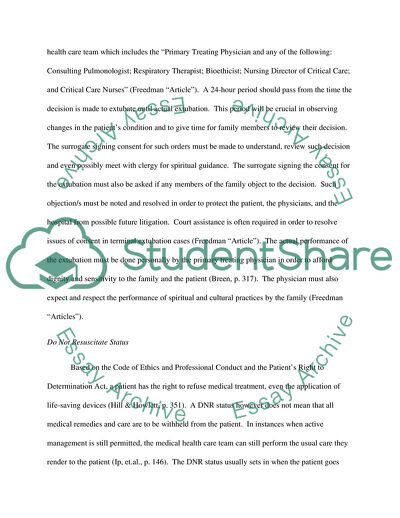
- Home
- Free Samples
- Premium Essays
- Editing Services
- Extra Tools
- Essay Writing Help
- About Us
- Studentshare
- Subjects
- Miscellaneous
- Law and Ethics in Health Care
Law and Ethics in Health Care - Essay Example

- Subject: Miscellaneous
- Type: Essay
- Level: Ph.D.
- Pages: 4 (1000 words)
- Downloads: 0
- Author: igaylord
Extract of sample "Law and Ethics in Health Care"
DNR orders with active management are a category for DNR patients who require active management of the patient until arrest, and no active management and resuscitation after arrest (Ip, et.al., p. 146). Organ donations are crucial life-saving measures. They are strictly voluntary. However, some nations like Singapore have passed legislation which includes citizens and permanent residents as organ donors (Ministry of Health Singapore). Lastly, the application of body and limbs restraints on violent patients is used in order to afford protection for medical professionals who are often in danger of being physically attacked or injured by violent patients (Manley, p. 144). In carrying out terminal extubations, the Code of Ethics and Professional Conduct has set down some guidelines for medical professionals to follow.
The code emphasizes that terminal extubations can only be done after a collective decision-making process has been carried out (Freedman “Articles”). This decision can be carried out only by the members of the patient’s health care team which includes the “Primary Treating Physician and any of the following: Consulting Pulmonologist; Respiratory Therapist; Bioethicist; Nursing Director of Critical Care; and Critical Care Nurses” (Freedman “Article”). A 24-hour period should pass from the time the decision is made to extubate until actual extubation.
This period will be crucial in observing changes in the patient’s condition and to give time for family members to review their decision. The surrogate signing consent for such orders must be made to understand, review such decision and even possibly meet with clergy for spiritual guidance. The surrogate signing the consent for the extubation must also be asked if any members of the family object to the decision. Such objection/s must be noted and resolved in order to protect the patient, the physicians, and the hospital from possible future litigation.
Court assistance is
...Download file to see next pages Read MoreCHECK THESE SAMPLES OF Law and Ethics in Health Care
Health Law and Ethics: Autonomy in Health Care Sector
Ethics, Law and Health Care
The Health Care Industry: Health Law and Ethics
Law and Ethics in Health and Social Care
Applied Health Care Ethics and Law
Law and Ethics in Health Care - Type : Case Study
Health Care Law and Ethics
Law and Ethics in Healthcare

- TERMS & CONDITIONS
- PRIVACY POLICY
- COOKIES POLICY